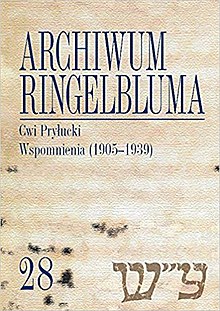Tsevi Pryłucki
Tsevi Hirsch Pryłucki , also Zevi Pryłucki, (born 1862 in Kremenez , Russian Empire ; died 1942 in the Warsaw Ghetto ) was a Polish newspaper editor and journalist.
Life
Tsevi Pryłucki grew up in a wealthy merchant family in Kremenez and learned Russian, French and German. He studied a couple of semesters in Kiev and Berlin . In the 1880s and 1890s, he was a Zionist activist in Volhynia to support the Jewish colonization of Palestine . In the language dispute he propagated Hebrew as the language of the Jews of Eastern Europe.
Pryłucki began his journalistic career with articles in Hebrew newspapers in which he dealt critically with Achad Ha'am's cultural Zionism . In 1898 he had to give up his trading business in Kremenez and moved to St. Petersburg . He continued to write Zionist articles for the Ha-Meliz newspaper , but also wrote in Yiddish and Russian newspapers. In 1905 he moved to Warsaw , where he founded both a Yiddish and a Hebrew newspaper, which soon had to be closed for economic reasons. In 1910 he went to the newly founded Yiddish daily newspaper Der Moment , the newspaper reached a circulation of 60,000 copies in 1914 before the outbreak of World War I and competed with the daily Haynt for first place among the Yiddish newspapers. From then on Pryłucki wrote a weekly political column.
Pryłucki died in the Warsaw Ghetto . Some of his memoirs on the Jewish newspaper landscape in pre-war Poland were saved from destruction by the Germans and are now in the Marigold Archives .
The Polish politician Noah Pryłucki was a son, he was also a victim of the Holocaust .
memories
- Cwi Pryłucki: Wspomnienia: (1905-1939) . Warsaw: Wydawnictwa Uniwersytetu Warszawskiego, 2015. Archiwum Ringelbluma; tom 28. ISBN 978-83-61850-44-1
literature
- Kalman Weiser: Pryłucki, Tsevi , in: YIVO Encyclopedia of Jews in Eastern Europe , pp. 1480f.
- YS: Prylucki, Zevi Hirsch , in: Encyclopaedia Judaica , 1971, Volume 13, Sp. 1295
- Keith Ian Weiser: Jewish people, Yiddish nation: Noah Prylucki and the Folkists in Poland . Toronto: University of Toronto Press, 2011
Web links
- Literature by and about Pryłucki, Cwi in the catalog of the German National Library
Individual evidence
- ↑ One moment , the one at YIVO
- ↑ The place of death is stated in the Encyclopaedia Judaica Wilna, in YIVO, however, Warsaw
| personal data | |
|---|---|
| SURNAME | Pryłucki, Tsevi |
| ALTERNATIVE NAMES | Pryłucki, Zevi Hirsch; Prilutsḳi, Deer Sholem |
| BRIEF DESCRIPTION | Polish editor and journalist |
| DATE OF BIRTH | 1862 |
| PLACE OF BIRTH | Kremenets |
| DATE OF DEATH | 1942 |
| Place of death | Warsaw Ghetto |

